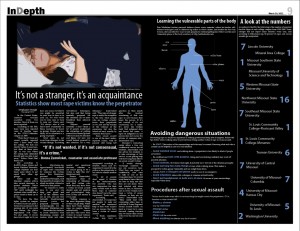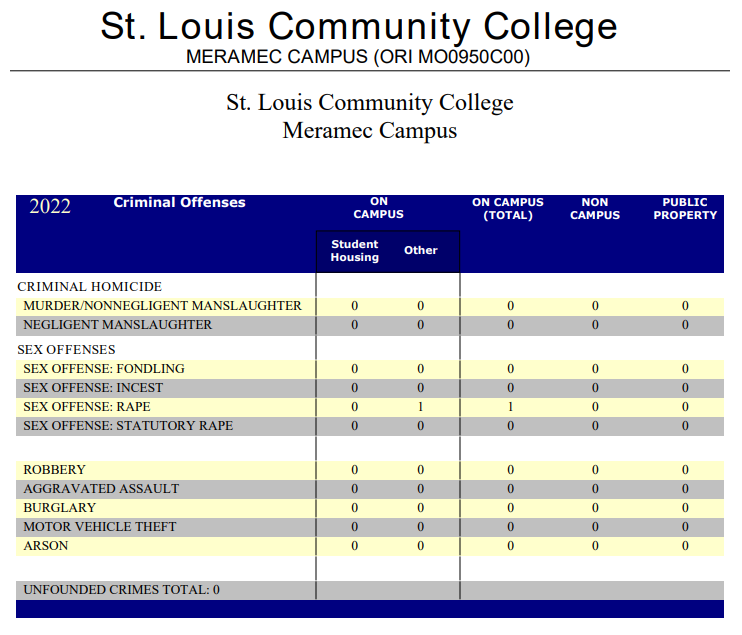Statistics show most rape victims know the perpetrator

Stephanie Stough
– Managing Editor –
![]()
In the United States, someone sexually assaulted every two minutes. Most of them are never reported.
According to the FBI, there were zero reported cases of forcible rapes on the STLCC-Meramec campus in 2009.
“There hasn’t been any sexual assaults reported since I have been with the college. We had one shortly before I came here, just short of three years ago. It was one where the young lady defended herself and was able to get away,” Police Chief Paul Banta said.
But according to RAINN (Rape, Abuse and Incest National Network), college students are four times more likely to get raped than other age groups.
Banta said that Meramec campus police take several measures to protect students. Police are available at 314-987-7667 until midnight for students who would like a police escort to their car or to class.
“We have the blue lights system on campus to where if you can push a button for assistance in the parking lots. If you push that button, the police department will come. We also offer, if you’re here late at night or if you have any reason to believe you might be assaulted on your way to class or to your car, we will escort you to your class or back to your car,” Banta said. “It’s always nice if you don’t have availability to those resources to travel in groups. People are less likely to be assaulted in a group of people.”
Most rapes do not occur from strangers to the victims though. According to http://rainn.org, approximately two-thirds of rapes were committed by someone the victims know. Ron Mirikitani, personal defense instructor at Meramec, said the majority of people who attack are either a friend or relative to that person.
“If someone is really nice to you and you drop your guard and all of the sudden they are on you, you are very tactically disadvantaged because you’re not prepared mentally or psychologically for the situation,” Mirikitani said.
He teaches his students to avoid situations with threatening people and teaches kicks and other self-defense techniques, but also said that being mentally prepared for the situation can be more beneficial than physical training.
“Prepare yourself mentally. I don’t think a lot of people understand the advantage of putting yourself in a mental picture where you may be attacked and figure out how you would defend yourself in that situation. It’s a very mental and emotional decision whether or not you’re going to be a victim or fight this off,” Mirikitani said.
Donna Zumwinkel, department chair of counseling at Meramec, said that victims who think they may have been a victim of sexual assault should seek out medical and psychological help, even if they are unsure if it was rape.
“Telling someone is the most important thing so they can get help. While there have been perhaps rapes on campus, there’s undoubtedly women and men who have been victims of sexual violence during their time here at Meramec,” Zumwinkel said. “This idea of stranger rape is really the exception to the rule. Most people who are victims actually know their perpetrator so it’s just not the trauma of the violence of the experience but also the breach of trust, usually by someone they know.”
Since sexual assault is one of the most under-reported crimes, with 60 percent still being left unreported according to RAINN, Banta said it’s important to report it to the police so the perpetrator is not able to commit another crime.
“A lot of people don’t report it because of the embarrassment, but anybody who has any compassion for their peers would want to take those steps so someone else doesn’t have the same experience,” Banta said.
According to Zumwinkel, it’s important for people to seek out medical and emotional help if they even suspect but are unsure they have been a victim of sexual assault.
“I think sometimes victims may have a question in their minds after the incident wondering if that was rape or not because they knew the person. If it’s not wanted, if it’s not consensual, it’s a crime. It’s never the victims fault. Bad judgment does not lessen the crime. A lapse of judgment on one person does not excuse the actions of someone else,” Zumwinkel said.
Meramec’s counseling center offers a free and confidential service for all students. Zumwinkel said her advice for students is to take advantage of this service, as not getting help will have long-term effects on sexual assault victims.
“I would strongly encourage someone to use our resources here. What they can expect is confidential, free time to talk to one of the counselors here. We would want them to know that we are here to help and that they are not alone. They feel isolated and alone when in fact, in Missouri, one in seven women have been a victim of sexual violence, so they are not alone,” Zumwinkel said. “They could start with counseling office here or with the St. Louis Regional Sexual Assault Center. As hard as it may be to come forward, coming forward may be easier than living with it for the rest of your life.”










